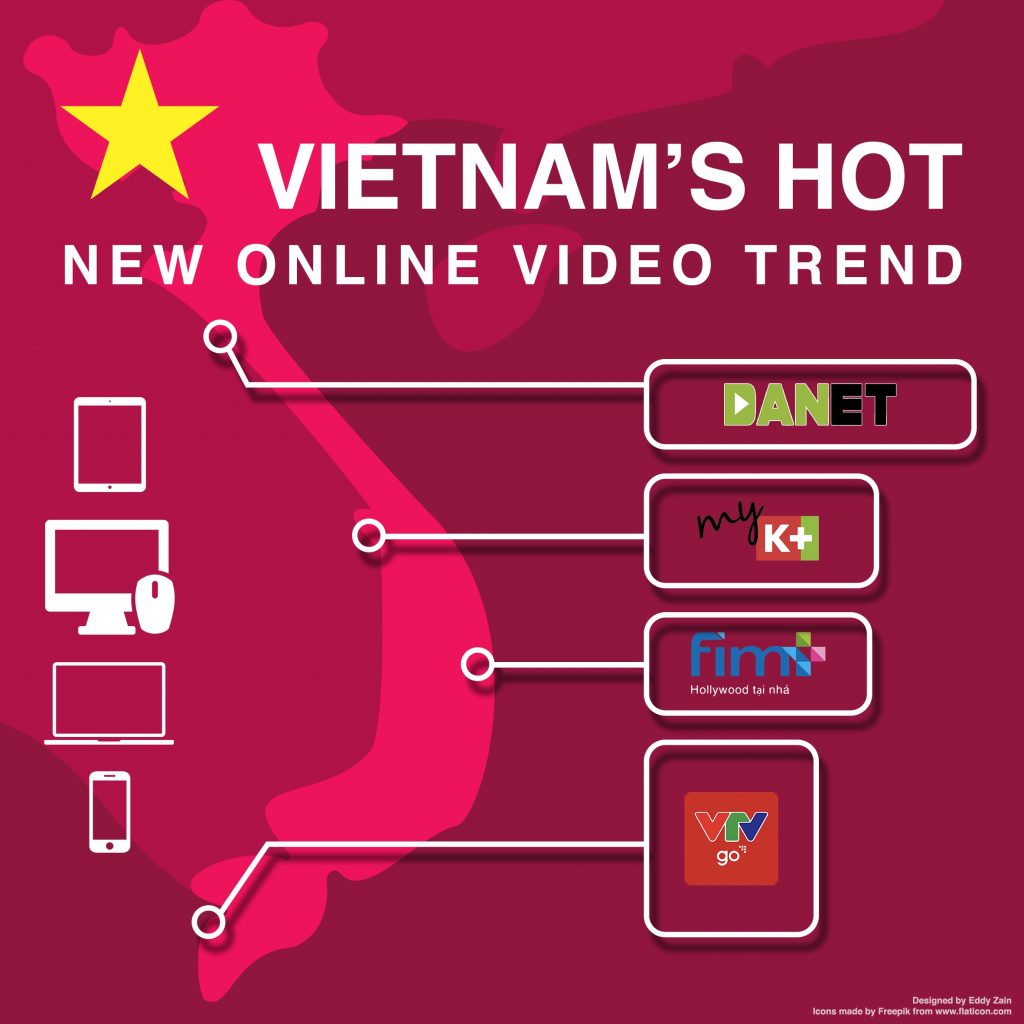Not All Smooth Sailing for Vietnam’s Emerging Online Video Trend
The influence of foreign pop culture is growing on young Vietnamese. The local youth lifestyle appears to be evolving towards ever more internationalized trends. This is impacting on every aspect of the entertainment industry, including cinema. As Vietnam “catches up with what’s up in the world,” Vietnamese are consuming more international movies and television shows along with more global music and sports.
Cinema in Vietnam has undergone numerous mutations in recent years, but perhaps the biggest revolution has been the emergence of online video streaming. This form of entertainment, so popular in many Western countries, is just now beginning to thrive in Vietnam, reaching millions of people. Its growing popularity is reshaping the way Vietnamese watch movies, and in turn presents a new range of policy and IP challenges for the stakeholders involved.
The attractiveness of online video streaming in Vietnam can be accounted for by four factors: accessibility, diversity, ease of use and price. These key characteristics sets online video streaming apart from other movie watching experiences. In an age when technology and connectivity puts everything at our fingertips, online video streaming is proving successful on the metrics of digital convenience and comfort.
Substantial public demand has naturally stimulated the development of legal video on-demand services. In just the past year, a number of sophisticated large scale online film distributors have stepped onto the scene, including DANNET from BHD, Fim+ from Galaxy, My K+ from K+, and VTV Go from VTV. Their growth and success will be a crucial driving factor for the audio-visual content industry in Vietnam. These online streaming services build a channel between the abundant international supply of content and the ever growing demand for quality content inside the country, and stimulates close working partnerships with international studios and rights owners. The various stakeholders are working towards the goal of creating an accessible, richly diverse, and easily accessible platform where movie lovers can enjoy great content at reasonable cost, within an authorized digital ecosystem.
But these innovative services are not sailing through wave-less oceans.
As of June 2017, Alexa rankings show that rogue online video streaming websites are to be found within the top 50 most-accessed websites in Vietnam, with the most popular pirate site occupying 19th spot.
These pirate websites are operating illegally and offer a wide library of pirated movies and television shows. Not only does this negatively impact on the legitimate cinema and online video businesses, but it presents numerous dangers to end-users. Rogue movie streaming websites are well-known locations for malware, ransomware, high-risks advertisements and many other troublesome digital parasites. A statistic in the Digital Citizens Alliance’s report – Digital Bait, December 2016, revealed the likelihood (about 30% in some cases) that users of content theft sites would infect their devices with malware. According to Kaspersky Lab’s Information Technology Threat Evolution report for Q3 2016, Vietnamese internet users are the 10th most at risk of cyber attacks globally. The effects on the end user can range from troublesome bugs, to catastrophic loss of data, both personal and commercial.
But despite all the risks involved, the appeal of free, accessible and latest release films and TV shows still seems irresistible to many Vietnamese.
Confronting this challenge requires a multi-pronged strategy that involves public awareness campaigns and a range of content protection measures. Fortunately, the Vietnamese Government is taking steps to address intellectual property protection.
A number of official initiatives have committed to raising public awareness on responsible intellectual property consumption. Improvements have also been made to copyright legislation, including new IP crime provisions in the Criminal Code. Since the first Intellectual Property Law of Vietnam passed in 2005, the country has been building upon this foundation to better protect authorized content production and distribution services.
Most recently, a number of stakeholders, in coordination with the Ministry of Information and Communication, initiated an Infringing Website List (IWL). To date, this has resulted in a reduction of around 69% of mainstream advertisements on the top five infringing websites in Vietnam.
If the authorized online video market is to survive and flourish, these measures and others will need to prove effective in dramatically reducing online infringement.
About the Author:
Hoang Viet Tien is Deputy General Secretary of Vietnam Internet Association (VIA) and works with Vietnam Post and Telecommunication (VNPT). He is an expert in digital marketing and content management. Tien has presented on new technologies at various international and domestic forums.


